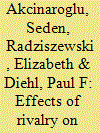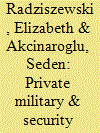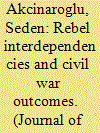|
|
|
Sort Order |
|
|
|
Items / Page
|
|
|
|
|
|
|
| Srl | Item |
| 1 |
ID:
131057


|
|
|
|
|
| Publication |
2014.
|
| Summary/Abstract |
The paper investigates how states manage multiple rivalries when faced with immediate threats. We argue that accommodation of one rival allows states to shift resources from the management of another rival to deal with the costs of immediate threats. By examining enduring rivalries from 1966 to 1999, we show that states' reliance on accommodation in response to threats varies depending on the number of severe threats and the relative capabilities between the states and the threat-issuing rivals. Findings show that when faced with severe but few threats, states prefer to accommodate rivals that did not issue the threat. They are also more likely to give larger concessions to such rivals and to those issuing less severe threats. Finally, the greater the military capability of a rival issuing a severe threat relative to that of the challenged state, the more likely that a threatening rival is accommodated.
|
|
|
|
|
|
|
|
|
|
|
|
|
|
|
|
| 2 |
ID:
179932


|
|
|
|
|
| Summary/Abstract |
PMSC training has the potential to improve state capacity, reduce the combatants’ opportunity and willingness to fight, and prolong the duration of peace. However, the benefit of PMSC training-related intervention over other types of PMSC interventions depends on the level of conflict complexity. Analysis of novel data on PMSC interventions and peace episodes following major/minor civil wars (1990–2008) shows that in cases when PMSCs intervene, training makes a positive contribution to peace in wars with a limited number of rebel groups that do not resort to terrorism. Positive impact dissipates in conflicts with greater levels of rebel fragmentation and terrorist tactics.
|
|
|
|
|
|
|
|
|
|
|
|
|
|
|
|
| 3 |
ID:
124139


|
|
|
|
|
| Publication |
2013.
|
| Summary/Abstract |
The article analyzes the impact of private military companies (PMCs) on the duration of civil wars in Africa from 1990 to 2008. We develop an "opportunity structure" theory to argue that while PMCs are profit-oriented entities, the prevalent opportunities in conflicts will determine how they behave in war zones. Empirical findings for civil wars with at least 1,000 battle deaths show that as level of competition among government-hired PMCs increases, they are more likely to deliver optimal services and help bring an end to violence. In the absence of competition, the prevalent structure creates opportunities for PMCs to underperform in order to maximize profits by staying in conflicts longer. The authors also show that swift cessation of hostilities could benefit those profit-seeking PMCs that are compensated with contracts to extract natural resources because resource extraction generates more wealth in peace time. In such cases, the prevalent opportunities in conflict create an incentive for companies to deliver optimal service and terminate hostilities.
|
|
|
|
|
|
|
|
|
|
|
|
|
|
|
|
| 4 |
ID:
115205


|
|
|
|
|
| Publication |
2012.
|
| Summary/Abstract |
The article investigates how rebel interdependencies shape civil war outcomes. The author argues that alliances between rebel groups will have serious repercussions on the management of conflict. By examining civil war outcomes between 1946 and 2008, the author shows that the presence of multiple groups, alliances among rebels, the cumulative capabilities of one's allies as well as the credibility and the durability of alliances shape war outcomes. Rebels have the means to avoid government defeat and continue conflict when the number of rebel groups the government has to confront simultaneously is high or when these groups cooperate against their common enemy. Findings show that while termination by peace agreement is unlikely for allied rebels, specifically for those that have enduring relationships, rebels with access to high levels of ally capabilities along with those who have credible alliance ties are likely to be the victors of war.
|
|
|
|
|
|
|
|
|
|
|
|
|
|
|
|
| 5 |
ID:
144089


|
|
|
|
|
| Summary/Abstract |
Violence against civilians is not the only tool among the arsenal of terrorists; it is only one of many. Up until now, there did not exist any quantitative data on the different strategies adopted by terror groups that measured the group’s popularity or its public support. The Reputation of Terror Groups dataset (RTG) addresses this void. To understand which terror groups build different types of reputation, to analyze the consequences of reputation building and how reputation changes with and influences conflict dynamics, we need to be able to measure the loaded concept of reputation. RTG is the first systematic measure for the reputation of terror groups across countries or time. The dataset includes 443 terror groups operating across 31 years, which makes a total of 2,641 observations. The large sample size of the RTG dataset allows comparisons of popularity among groups. Additionally, the dataset adopts a multivariable approach by examining multiple aspects of both positive and negative reputation building. Another novelty of the dataset is its measure of reputation with regard to each target, mainly its constituency and target audience. The RTG data can help us come up with new and novel ways of understanding terror groups, and contribute to bridging the gap between micro- and mezzo-level studies in the literature by showing how terror groups adopt different strategies in their constituency and target audience to pursue their goals. In this article, we give an overview assessment of the RTG dataset, display some interesting trends in the data, and explain the data collection procedure, its challenges, and its limitations.
|
|
|
|
|
|
|
|
|
|
|
|
|
|
|
|
| 6 |
ID:
154926


|
|
|
|
|
| Summary/Abstract |
We examine what leads states to accommodate enduring, international rivals in response to immediate threats. Drawing from network theory, we hypothesize that the direct and indirect ties the threatened state’s rivals form with each other and with other states in the global system play a critical role in shaping crisis. A threatened state should be more likely to accommodate rivals with economic connections to other actors. These connections generate influence, through leverage or information that can lead to crisis de-escalation. A threatened state is less likely to accommodate a rival that has military alliances with other rivals because credible allies are less likely to respond to such overtures. We use network analysis and data from the post–Cold War era to support the argument, shedding light on the importance of local and global connectivity in conflict management.
|
|
|
|
|
|
|
|
|
|
|
|
|
|
|
|
|
|
|
|
|